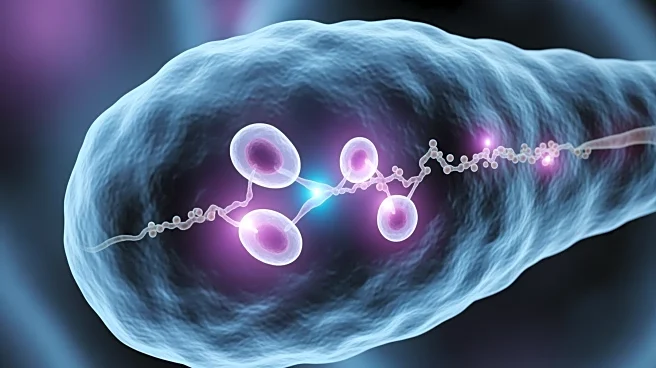What's Happening?
A new study from the Perelman School of Medicine at the University of Pennsylvania has identified a hidden group of immune 'attack' cells in the pancreatic lymph nodes that appear early in the development of Type 1 diabetes (T1D). This discovery could
offer a chance to detect and potentially stop the progression of T1D. The research, published in Science Immunology, analyzed nearly one million immune cells from the pancreatic lymph nodes and spleens of 43 organ donors, including those with T1D, those showing early warning signs, and healthy individuals. The study found a unique subset of CD4 T cells in the pancreatic lymph nodes of people with active T1D, which ramp up two proteins, NFKB1 and BACH2, that act as master switches, turning genes on and off to rev up the immune attack on insulin-producing cells.
Why It's Important?
The identification of these immune cells is significant because it provides insight into the early stages of T1D, potentially allowing for earlier detection and intervention. This could lead to the development of blood tests to flag T1D risk years before symptoms appear, enabling monitoring of at-risk individuals without invasive procedures. The ability to block the pathways fueling these rogue CD4 T cells could delay or prevent the onset of T1D, offering hope to millions of Americans affected by the disease. The research also highlights the collaborative efforts of organ donors, researchers, and medical professionals in advancing scientific understanding and potential treatments for T1D.
What's Next?
The study suggests that further research could focus on developing blood tests to detect T1D risk and exploring ways to block the pathways that fuel the rogue CD4 T cells. This could involve monitoring at-risk children, such as family members of T1D patients, to prevent the disease's progression. The research team plans to continue studying pancreas and lymph node tissues from organ donors, generating data accessible to other researchers via the PANC-DB public database. This ongoing research could lead to new preventive strategies and treatments for T1D.
Beyond the Headlines
The study underscores the importance of organ donation in medical research, as the tissues donated by deceased individuals and their families have been crucial in advancing the understanding of T1D. The collaborative nature of the research, involving surgeons, scientists, families, and funders, exemplifies the power of teamwork in making scientific breakthroughs possible. The findings also raise ethical considerations regarding the monitoring and intervention in at-risk populations, highlighting the need for careful consideration of privacy and consent in medical research.















